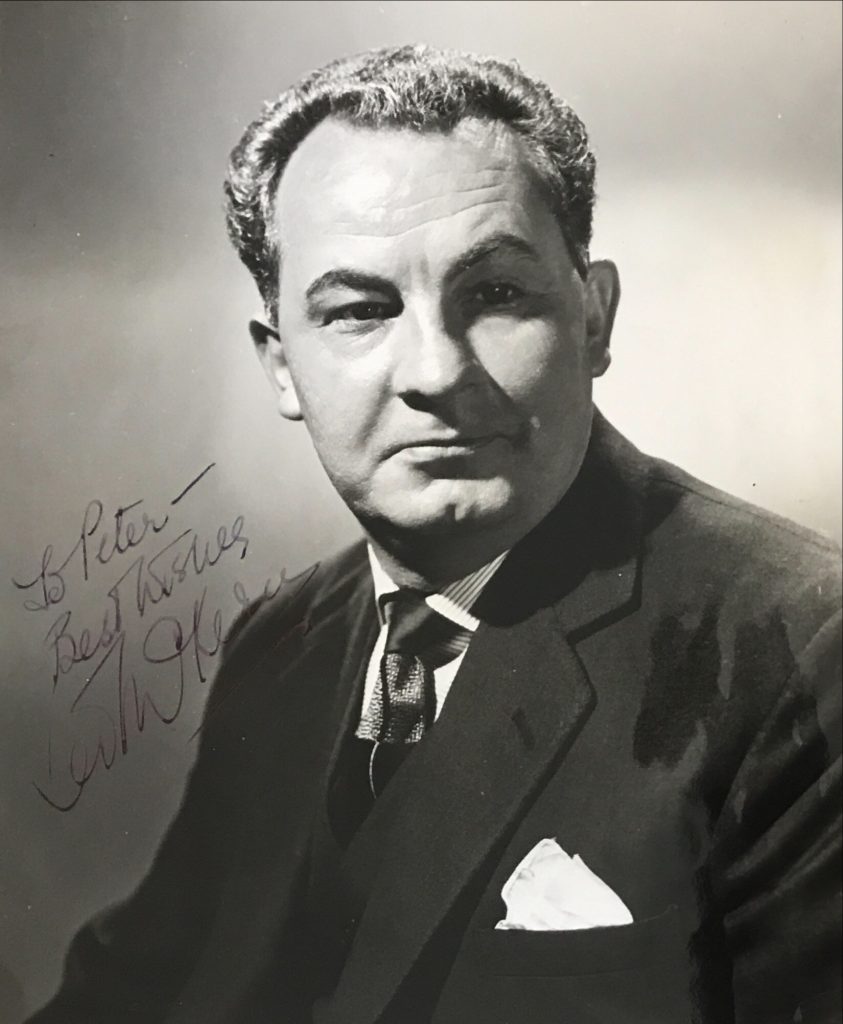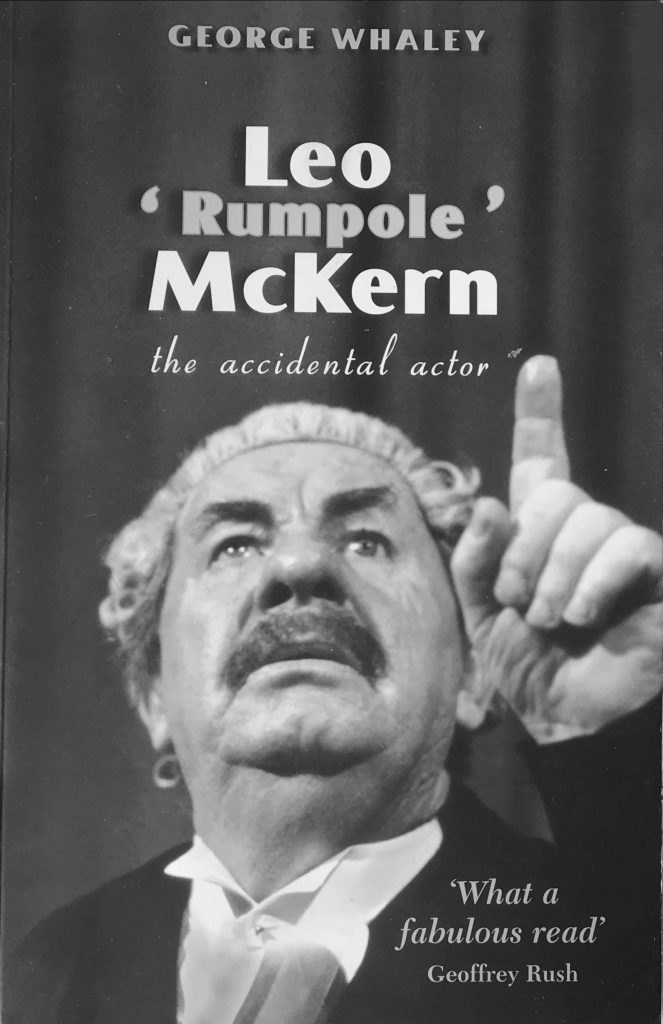

Leo McKern is firmly associated with “Rumpole of the Bailey” but he was a terrific character actor on film and on reflection it is a pity that Rumpole took up so much of his time, that it deprived us of him from the cinema. He was born in Sydney, Australia in 1920. He lost an eye at the age of 15 in an accident. During World War Two he made his stage debut in this home city. He came to England in 1976 and soon became a regular with the Old Vic company. His film debut was in 1952 with “Murder in the Cathedral”. His many appearance thereafter included “Help”, “A Man For All Seasons”, “Ryan’s Daughter”, “The Omen” and “The French Lieutenant’s Woman”. His first episode as Rumpole began in 1975 and in all he starred in 44 episodes. He died in 2002 at the age of 82.
“The Guardian” obituary:
Leo McKern, who has died aged 82, was best known and admired for his most famous character, the crumpled, combative defence barrister Horace Rumpole in John Mortimer’s television series, Rumpole Of The Bailey. But he was also one of the finest and most resourceful actors in Britain, with a long and distinguished career in the theatre and films.
Short and stocky, he was not built for romantic leads, but he was capable of playing – and playing well – a wide range of parts, from Peer Gynt to Toad of Toad Hall, Lear’s Fool to the Common Man, and, later, Thomas Cromwell, both on stage and in the film A Man For All Seasons (1966).
He took on Rumpole for the first time in 1975, in a television play based on the Mortimer novels. His portrayal was a hit with viewers, and his references to his wife Hilda as “she who must be obeyed” became part of the nation’s vocabulary. The ITV series which followed ran for 15 years.
McKern was happy to continue portraying the same character for so long – “With Rumpole,” he once said, “one comes to be reconciled to the fact that it isn’t half a bad thing to be stuck with.” However, in an interview with Vanity Fair in 1995, he also made the point that “I consider my best performance ever was as Peer Gynt, though if I get an obituary, they will say, of course, ‘known to millions as Rumpole’.”
Born into a family of engineers in Sydney, McKern left school – where his English master had instilled a hatred of Shakespeare – at 15, and joined his father and brothers working in a refrigerator factory. While there, a piece of metal flew into his left eye; though the injury was not, at first, considered serious, the sight deteriorated and eventually the eye had to be removed. With his portion of the compensation – his parents sued the surgeon who had first attended him – McKern bought an old boat, the first of several he owned, and wrecked it in Sydney harbour.
After training and working as a commercial artist, he decided to try acting, and duly appeared in theatre in Sydney. In 1944, he sailed away in pursuit of Jane Holland, who was well known on the Australian stage and wanted to try her luck in England. They married, and lived for a time in a Hampstead bedsitter, taking various jobs. McKern was a meat porter, and drew slides for the cinema, though he was also sacked for selling under-the-counter goods to pensioners. As assistant stage manager, he went on a combined services entertainments tour of Germany; back in London, he became a jeweller’s stone-setter, while Jane was a cinema usherette.
In repertory at Bangor, McKern worked long hours painting scenery, stage managing and acting, before going on an Arts Council tour of Welsh mining villages in The Miser, directed by Tyrone Guthrie, a contact which eventually resulted in his joining the Old Vic Company in 1949. In the first of three seasons there, he played small parts, and, as an understudy, went on as Tony Lumpkin in She Stoops To Conquer. His best part the following season was Feste in Twelfth Night.
In Guthrie’s production of Marlowe’s Tamburlaine The Great – the first for 300 years – McKern played Bazajeth, Emperor of the Turks and Tamburlaine’s chief adversary. This was a part in which he could show his physical skill and energy, but also an unnerving experience as Donald Wolfit (Tamburlaine) was given to distracting the audience’s attention from everyone except himself. Before the end of the season, in which he was due to play Lear, Wolfit left – and McKern shone as the Fool.
Many years later, he appeared in the play again, this time on television, as Gloucester, with Laurence Olivier as Lear, and, having progressed to leading parts, he went back to Australia with the Stratford company, as Iago to Anthony Quayle’s Othello.
Back in England at Christmas 1954, McKern enjoyed playing Toad to large audiences of children at the Prince’s theatre (now the Shaftesbury). His first strong West End part was as Big Daddy in Peter Hall’s production of Cat On A Hot Tin Roof (1958); two years later, he took the title part in Marcel Achard’s Rollo. His next outstanding performance was as the Common Man, in A Man For All Seasons, which created a mild sensation as a Brechtian experiment. Grabbing costumes from a basket on stage, McKern was both commentator and storyteller, though in New York, and in the film, he played Thomas Cromwell.
For Peer Gynt, one of his most taxing – but also most satisfying – roles, McKern returned to the Old Vic in 1962. Although he knew he was too old for the part, he comforted himself in the knowledge that Ibsen never intended the play to be staged. Some years later, he discovered that Guthrie had described it as “brilliant”.
In Guthrie’s modern dress production of The Alchemist (Old Vic, 1962), he had to make an entrance three feet above the ground. The following year, he was back with Iago, as well as playing the garrulous elder statesman Menenius, in Coriolanus, at the opening of the Nottingham Playhouse. At the Oxford Playhouse and later in London, he was an explosive Volpone – his second Jonson character in the 1960s. He was also part of the swinging 60s to the extent of appearing with the Beatles in Help (1965), and in the cult TV series The Prisoner.
In 1970, McKern returned to Australia to play Bligh in The Man Who Shot The Albatross and Rollo. Back at the Oxford Playhouse, he was Shylock, and Kelemen in Molnar’s The Wolf, opposite Judi Dench. There were also film ventures, including Ryan’s Daughter (1970), which involved almost a year’s stay on the west coast of Ireland – he took along his wife and daughters, and his 32ft sloop.
McKern returned to the theatre in 1995, as Old Hobson in Hobson’s Choice at Chichester, giving a performance that was a nice blend of pathos and northern humour (his last West End performance was in the same play two years ago). Also at Chichester, in 1996, he played the press photographer Henry Ormonroyd, in a revival of Priestley’s When We Are Married, with, wrote the Guardian critic Michael Billington, “the stately dignity of a tipsy porpoise”. His last film role was as a bishop in a period drama, The Story Of Father Damien (1999).
In later life, McKern suffered health problems. He had diabetes and became deaf in one ear. As well as boats, he was fond of fast cars, of which he had many. He is survived by Jane, and their daughters Harriet and the actor Abigail McKern.
· Leo (Reginald) McKern, actor, born March 16 1920; died July 23 2002
“The Guardian” obituary can also be accessed online here.

